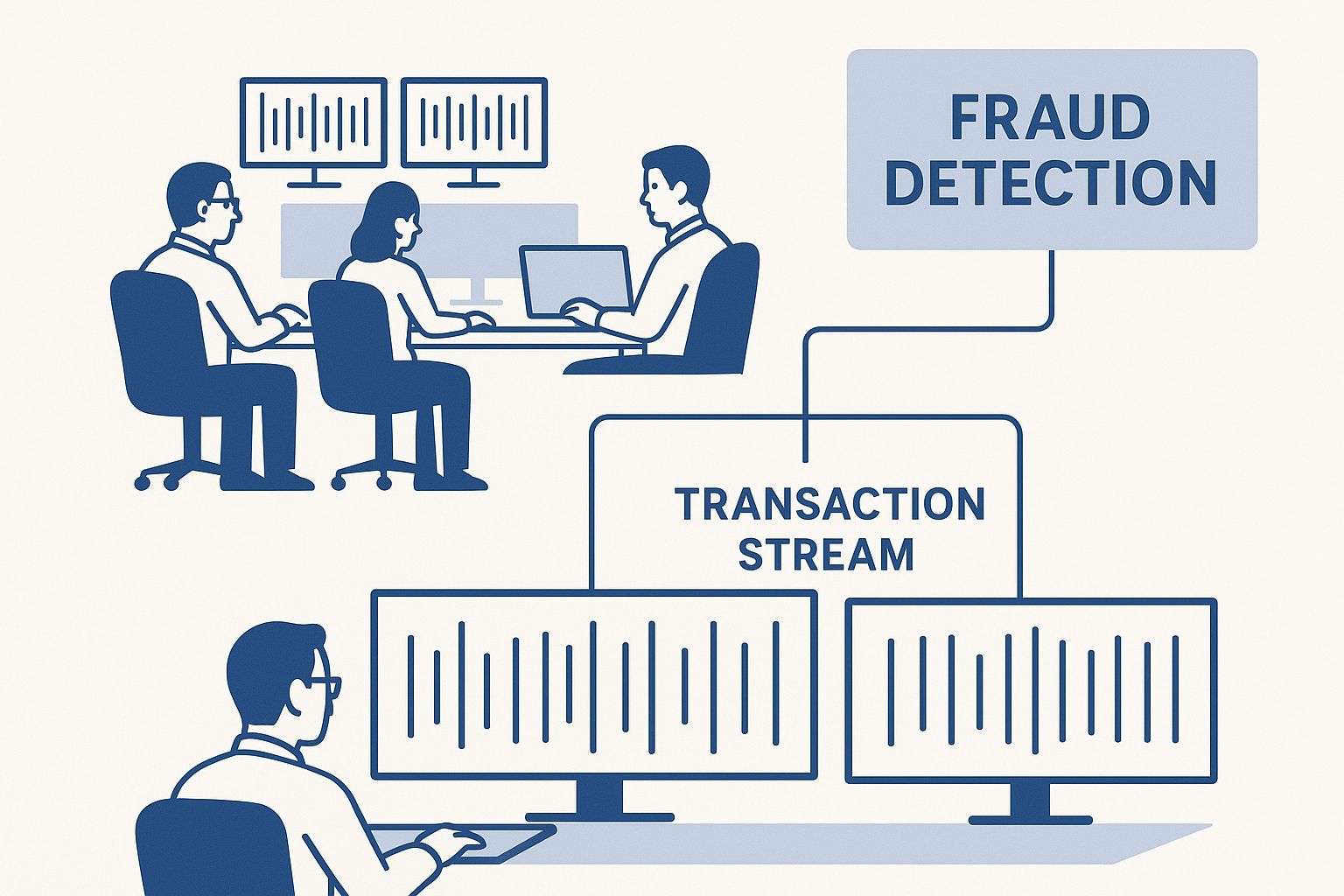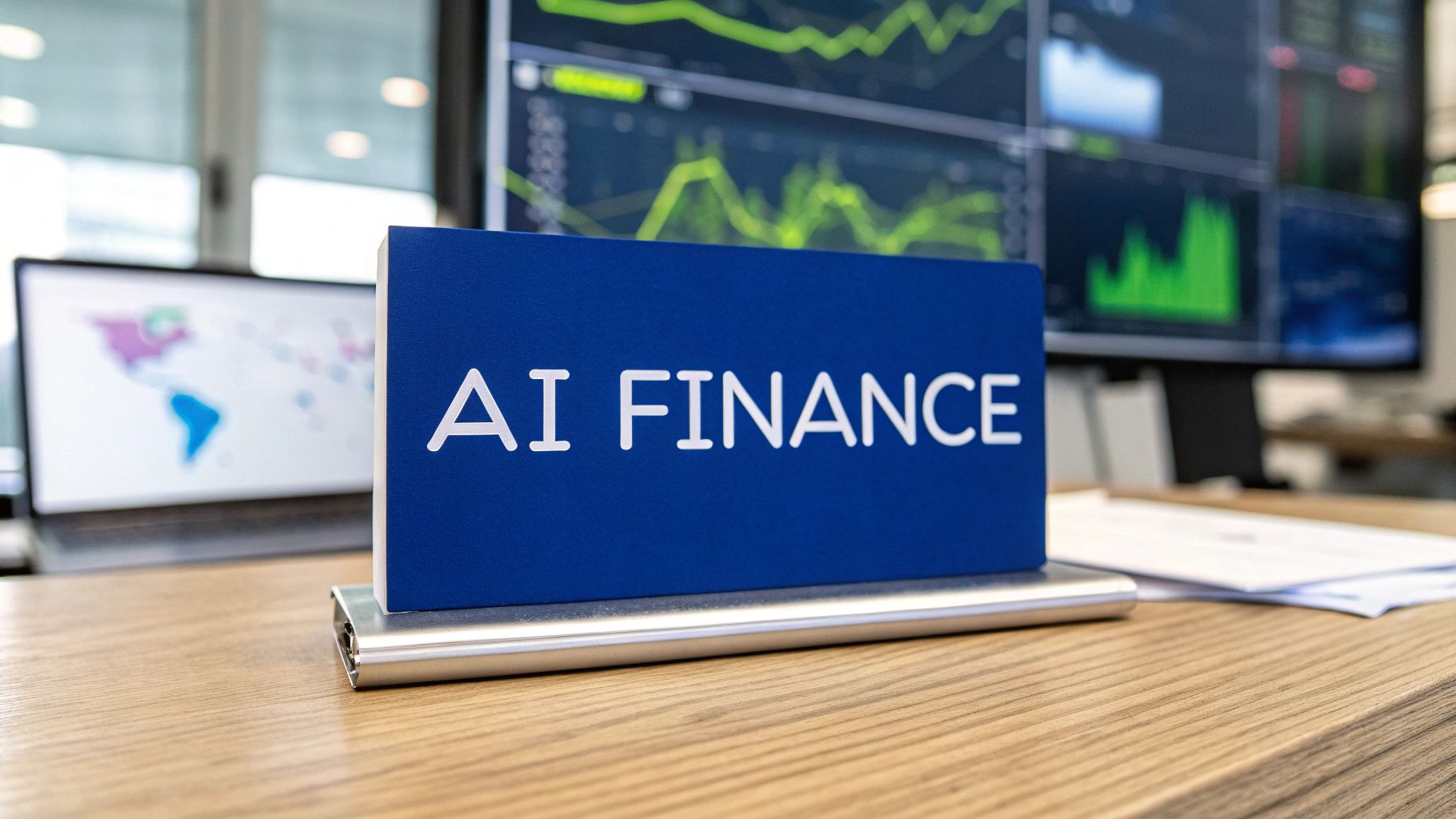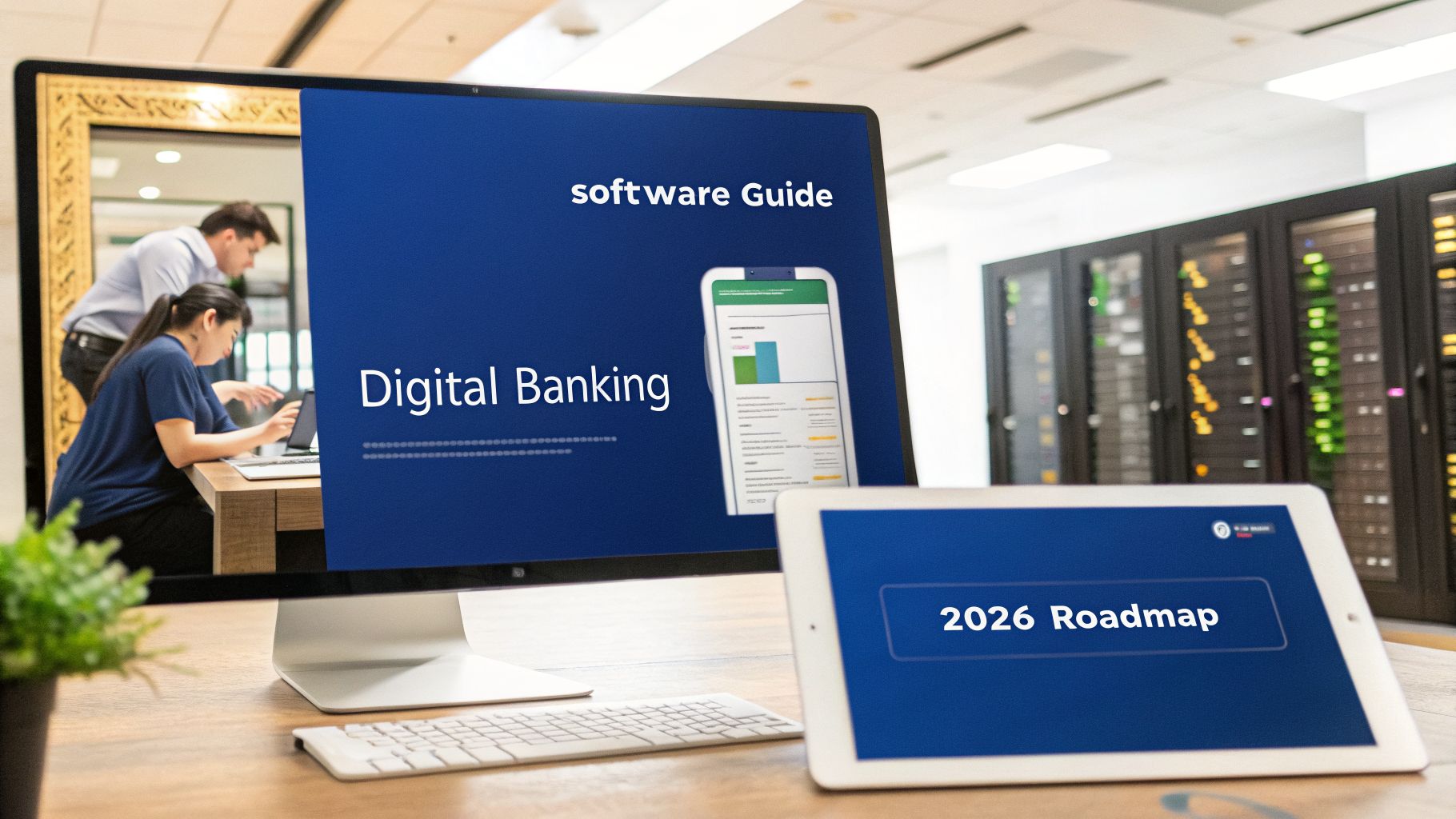Staring at endless spreadsheets of financial data can be dizzying. But what if you had a super-analyst on your team, one that could spot every single pattern, risk, and opportunity in a split second? That's exactly what ai in finance brings to the table. We're not talking about science-fiction robots; we're talking about intelligent software that makes financial decisions smarter, faster, and more precise right now.
The New Reality of Intelligent Finance in Canada
In Canada, artificial intelligence is shifting the financial sector away from old-school manual work and reactive problem-solving. It’s ushering in an era of predictive, automated systems. This isn’t a far-off trend; it’s happening today, giving early adopters a serious competitive edge. The real magic of AI is its ability to chew through enormous datasets at a speed and accuracy no human could ever match, pulling out valuable insights that were once completely hidden.
This shift allows financial institutions to stop getting bogged down in data entry and repetitive reporting. Instead, their teams can concentrate on what really matters: big-picture strategies like creating personalized customer journeys or getting ahead of market risks before they become problems. For any leader in the AI in Finance Industry, getting a handle on this evolution is essential for staying in the game.
A Rapidly Accelerating Adoption Rate
The momentum here is impossible to ignore. Canadian companies are jumping on the AI bandwagon, and fast. As of early 2025, an impressive 82% of firms reported using AI in some capacity within their finance departments. That number puts Canada well ahead of the global average of 71%, positioning the country as a frontrunner in financial innovation. You can see the full breakdown of these findings on how AI is transforming Canadian finance on kpmg.com.
This swift adoption is happening for one simple reason: it gets results. By taking over routine tasks and providing powerful analytical insights, professional AI Development Services deliver clear business wins, including:
Better Operational Efficiency: When tasks like invoice processing and contract reviews are automated, your team is free to focus on strategic thinking.
Smarter Risk Management: AI systems are brilliant at spotting fraud in real-time and can even predict potential market downturns.
Sharper Decision-Making: With insights pulled directly from data, your forecasts become more accurate and your strategic choices more reliable.
The way AI is being used here mirrors trends we're seeing across other industries. To get a sense of the bigger picture, check out our guide on how AI is shaping Canadian retail. It's clear that to lead in any modern industry, you need to master this technology. To see the team helping businesses navigate this new landscape, we invite you to explore our company's story.
Understanding the AI Technologies Driving the Change
To really get a handle on what AI is doing in finance, you need to peek under the bonnet and look at the core technologies making it all happen. These aren't just abstract ideas; they're powerful tools working in concert to reshape how financial institutions operate. When you break them down, you start to see how they build practical, high-impact solutions across the industry.
The image below gives a great visual of how a technology like Machine Learning is put to work in critical areas, like fraud detection, where it constantly scans streams of transactions in real-time.

You can think of AI as a vigilant overseer on a high-tech trading floor, instantly flagging unusual activity that a human eye might miss.
To give you a clearer picture, here's a quick breakdown of the key AI technologies and what they actually do in a financial setting.
Key AI Technologies in Finance and Their Functions
AI Technology | Primary Function in Finance | Example Use Case |
|---|---|---|
Machine Learning (ML) | Learns from historical data to identify patterns and make predictions about future outcomes. | A bank’s algorithm analyzes millions of past loan applications to more accurately predict the likelihood of a new applicant defaulting. |
Natural Language Processing (NLP) | Reads, interprets, and understands human language from text and speech. | An investment firm uses NLP to scan thousands of news articles and social media posts to gauge market sentiment on a particular stock. |
Robotic Process Automation (RPA) | Automates repetitive, rules-based digital tasks. | A software “bot” handles the data entry and system updates required for new client onboarding, running 24/7 without error. |
These technologies are the fundamental building blocks, each with a distinct role. Now, let's explore them in a bit more detail.
H3: Machine Learning: The Predictive Detective
At the very heart of financial AI is Machine Learning (ML). The best way to think of it is as a brilliant detective who learns from past evidence, in this case, massive amounts of historical financial data, to predict what might happen next. Instead of being given a strict set of rules, ML models figure out the patterns all on their own.
For instance, a bank's ML algorithm can sift through millions of old loan applications to pinpoint the subtle traits of borrowers who are most likely to default. This goes miles beyond a simple credit score, weaving together hundreds of variables to create a far more nuanced and accurate risk profile. That predictive power is a cornerstone of modern finance.
H3: Natural Language Processing: The Universal Translator
Next up is Natural Language Processing (NLP), which basically acts as a universal translator for human language. Financial firms are constantly swamped with unstructured text, from customer support emails and social media comments to dense regulatory documents.
NLP gives computers the ability to read and make sense of it all. An insurance company, for example, could use NLP to automatically scan and sort thousands of claims documents, pulling out key details and flagging signs of potential fraud. It’s the key to turning a mountain of words into structured, usable information.
H3: Robotic Process Automation: The Digital Workforce
Finally, there's Robotic Process Automation (RPA), which is like having a tireless digital workforce. RPA uses software "bots" that are programmed to handle all those repetitive, rules-based digital jobs, the kind of work that’s often tedious and easy for humans to make mistakes on.
By automating high-volume, repeatable tasks, RPA frees up skilled financial professionals to focus on strategic analysis and client interaction, driving greater value for the organisation.
Think about the process of onboarding a new client. It can involve dozens of manual steps, like entering the same data into multiple systems. An RPA bot can do all of that flawlessly, day or night, ensuring everything is fast, accurate, and compliant. The boost to efficiency is massive.
H3: How These Technologies Work Together
The real magic happens when these technologies are combined. An investment firm might use NLP to analyse breaking news for market sentiment, feed those insights into an ML model to predict stock price movements, and then use RPA to execute trades based on what the model recommends.
This synergy creates an incredibly powerful, automated decision-making engine. Of course, building a reliable model requires rigorous testing against historical data, which involves a ton of simulation and fine-tuning through techniques like backtesting trading strategies.
These core components are the building blocks for nearly every application of AI you see in finance today. Understanding them is the first step toward appreciating their full potential.
How AI Is Reshaping Financial Services Today
We're moving past the theoretical and into the real world, where artificial intelligence is actively changing the financial sector as we speak. The technologies we’ve been discussing aren't just buzzwords; they're the engines behind practical, high-impact applications that are fundamentally altering how financial services operate day-to-day. This is where you can see the true value of AI in finance. It’s shifting institutions from simply reacting to problems to operating with proactive intelligence.
Let’s dig into some of the most significant ways this is happening and see the "before and after" of AI adoption. These real-world examples really drive home the concrete value AI brings to the table.

A New Era for Algorithmic Trading and Investment
Not long ago, traders relied on a mix of fundamental analysis, technical charts, and plain old gut instinct. While that approach worked to a degree, it was always limited by human speed and the sheer impossibility of processing vast, unstructured data sources like news sentiment or social media chatter.
Now, we have AI-powered algorithmic trading systems that can tear through market data at speeds no human team could ever dream of matching. These systems use machine learning to spot incredibly complex patterns and predictive signals, executing trades in milliseconds to capitalize on opportunities that vanish in the blink of an eye. They don’t just react to price changes; they anticipate them by digesting global news, economic reports, and even satellite imagery to make smarter predictions.
By processing enormous datasets in real time, AI trading algorithms can identify and act on market inefficiencies that are completely invisible to human traders, creating a distinct competitive advantage.
This shift means investment decisions are becoming far more data-driven and much less susceptible to emotional bias.
Fortifying Fraud Detection and Security
One of the most critical jobs for AI in finance is in the ongoing battle against financial crime. For years, fraud detection was based on a rigid, rules-based system. It could only flag transactions that matched a predefined list of suspicious patterns, which made it slow and painfully easy for clever criminals to sidestep.
AI changes the game entirely. Instead of relying on static rules, machine learning models learn the normal behaviour of each customer. They can analyze thousands of data points for every single transaction, such as time of day, location, purchase amount, and device used, to build a dynamic and highly accurate profile. The moment a transaction deviates from this established pattern, the system flags it for review in real time, often stopping a fraudulent transaction before it’s even completed.
Financial institutions in Canada are increasingly prioritizing AI for this very reason. A 2025 industry survey revealed that 64% of financial professionals reported implementing AI technologies within the past two years, with fraud prevention being a major driver. This reflects a clear need to stay ahead of ever-evolving threats.
Personalizing the Banking Experience
The traditional banking experience has always felt a bit… one-size-fits-all. Customers received generic product offers and standardized service, regardless of their unique financial situation or goals. That impersonal approach is quickly becoming a relic of the past.
AI is now enabling hyper-personalization on a massive scale. Here’s how:
AI-Powered Chatbots: These aren't the clunky bots from a few years ago. Modern chatbots use Natural Language Processing (NLP) to understand complex questions and provide instant, 24/7 support for everything from checking a balance to disputing a transaction.
Personalized Product Recommendations: By analyzing a customer's spending habits, income, and financial goals, AI algorithms can suggest genuinely useful products, like a high-interest savings account for someone saving for a down payment or a low-interest credit card for someone trying to consolidate debt.
Proactive Financial Advice: AI can act as a digital financial advisor, sending an alert about a potential low balance or suggesting ways to save money based on spending patterns.
This kind of tailored approach doesn’t just improve customer satisfaction; it builds deep, lasting loyalty.
Creating Fairer and More Accurate Credit Scoring
Traditional credit scoring models have long faced criticism for relying on a limited set of data points, which can sometimes exclude deserving applicants or even perpetuate biases. AI is helping to build a more equitable and accurate system.
AI-driven credit models can analyze a much wider range of alternative data, like rent payments, utility bills, and even cash flow patterns in a bank account. This provides a much more holistic view of an individual's financial responsibility. By looking beyond a simple credit history, lenders can make fairer, more informed decisions, potentially opening up access to credit for millions of people who were previously left out. Mastering AI for financial analysis is central to building these sophisticated models and improving both investment and risk management strategies.
The Business Case for Adopting Financial AI
So, why are Canadian financial institutions pouring so much money into artificial intelligence? It’s not just about chasing the latest tech trend. Bringing AI into finance is a fundamental business decision that delivers real, measurable results. It’s about building a smarter, tougher, and more profitable company from the inside out.
The image below captures the essence of this shift. A professional environment where data-driven decisions are everything, showing how AI underpins the strategic thinking needed in modern finance.

This isn't just a simple system upgrade. It's a complete reimagining of how financial operations work, leading to powerful improvements across the entire organisation.
Boosting Operational Efficiency
One of the first things you’ll notice after bringing in AI is a massive jump in operational efficiency. So many traditional finance jobs get bogged down in repetitive, manual work, think data entry, processing invoices, and running compliance checks. These tasks don't just eat up time; they're also breeding grounds for human error, which can get expensive.
AI, especially tools like Robotic Process Automation (RPA), steps in to handle these duties with near-perfect accuracy and incredible speed. Software bots can run 24/7 without a single break, chewing through thousands of documents and transactions. This frees up your talented finance professionals to concentrate on what really matters: strategic analysis, building client relationships, and solving complex problems.
Sharpening Risk Management and Compliance
The world of finance is riddled with risk, from unpredictable market swings to increasingly clever fraud schemes. AI acts as a powerful shield, dramatically improving your ability to manage that risk. Machine learning models can sift through enormous datasets in real-time, spotting faint patterns that might signal fraud and stopping bad transactions before they happen.
On top of that, AI helps firms navigate the labyrinth of ever-changing regulations. AI systems can automatically screen transactions to ensure they meet rules like anti-money laundering (AML) laws. This creates a rock-solid audit trail and seriously cuts down the risk of getting hit with heavy fines.
Adopting AI isn't just a tech upgrade; it's a strategic necessity for any financial institution that wants to grow sustainably, improve its bottom line, and stay ahead of the competition.
Delivering Superior Customer Experiences
In a crowded market, the customer experience is what sets you apart. AI gives financial institutions the tools to offer the kind of personalized, quick-fire service that builds genuine loyalty. And we're talking about much more than just a basic helpdesk.
24/7 Intelligent Support: AI-driven chatbots can answer routine customer questions instantly, any time of day, letting human agents focus on more difficult issues.
Personalised Recommendations: By looking at a customer’s spending and saving habits, AI can suggest genuinely useful products, like a better savings account or a custom-fit investment plan.
Proactive Guidance: AI systems can give customers a heads-up about potential problems, like a looming low balance, or offer tailored advice for improving their financial well-being.
These features change the entire customer relationship from a simple series of transactions to a trusted advisory partnership. To see how data drives these strategies, digging into the role of business intelligence in financial services offers some great context. This powerful combination of efficiency, security, and customer care makes a clear case: AI is no longer optional for growth.
Navigating the Hurdles of AI Implementation
Bringing artificial intelligence into the fold is a powerful move, but let's be realistic; the path isn't always a straight line. To truly understand the role of AI in finance, we need to talk about the real-world hurdles that organisations run into. These aren't showstoppers, but they are serious risks that demand careful planning and a clear-eyed strategy.
Getting AI right is about more than just slick algorithms. It's about building a solid foundation of trust, security, and talent. For most firms, the toughest challenges come down to wrangling data, staying on the right side of regulations, and finding people with the right skills to steer the ship.
The Critical Role of Data Governance and Security
High-quality data is the fuel that makes any effective AI system run. Without clean, well-organized, and secure data, even the most sophisticated models will spit out unreliable insights. This is a massive concern in the AI in Finance Industry, where data integrity is everything.
Recent findings really drive this point home: 61% of respondents listed data privacy and security as their top priorities when implementing AI. At the same time, 59% said poor data quality was a major roadblock. These numbers, highlighted in a report on Canadian AI adoption trends on chambers.com, show that financial institutions can't just bolt on AI for fraud detection; they have to build iron-clad data frameworks that protect privacy and guarantee accuracy from the ground up.
This makes a robust data governance framework absolutely non-negotiable. It’s the rulebook that needs to spell out clear policies for:
Data Collection: Making sure data is gathered ethically and legally.
Data Storage: Using secure solutions to protect incredibly sensitive financial information.
Data Access: Defining exactly who can see what, and when, to prevent breaches.
Strengthening these areas is fundamental. For a deeper dive, our guide on strategies to enhance fintech app security covers essential defensive measures.
Addressing Regulatory Compliance and Ethical Concerns
The financial sector is already one of the most regulated industries on the planet, and AI adds a whole new layer of complexity. Regulators are rightfully focused on making sure AI models are fair, transparent, and accountable. One of the biggest ethical minefields here is algorithmic bias, where a model makes unfair decisions because of hidden biases in the data it was trained on.
Think about it: a biased credit scoring model could systematically deny loans to people from certain backgrounds, which is a recipe for legal and reputational disaster. The solution is to build models that are not just smart, but also transparent.
Explainable AI (XAI) is an approach that makes sure the decisions an AI model makes can actually be understood by a human. It turns the AI from a "black box" into a clear, trustworthy tool, which is critical for building confidence with both regulators and customers.
Earning this trust is vital for getting buy-in and making sure your AI solutions are both effective and compliant. It's a core principle that shapes our own approach to AI Development Services.
Overcoming the Talent Shortage
Finally, let's talk about one of the most practical hurdles: finding the right people. There’s a huge demand for professionals who have that rare mix of financial expertise, data science chops, and AI development skills.
Finding someone who can build, manage, and interpret these complex AI systems is a real challenge for many companies. This skills gap can easily slow down projects and prevent you from getting the full value out of your AI investments. To get ahead, firms need to invest in training their current teams and find the right expert partners to help bridge the gap.
The Future of AI in Canadian Finance
Looking at the horizon, the role of AI in finance is set to stretch far beyond what we see today. We're on the cusp of a major shift, moving past the current standards of risk management and process automation. The next chapter is all about creating financial services that are proactive, predictive, and intensely personal. The journey is just getting started, but a few key trends are already carving out this exciting future for Canada's financial sector.
The momentum is undeniable. According to the Canadian Survey on Business Conditions, 12.2% of Canadian businesses were using AI to produce goods or deliver services in the second quarter of 2025. That's a huge jump from just 6.1% during the same time in 2024. You can dig into the full numbers yourself in the official government publication on statcan.gc.ca.
The Rise of Generative AI and Hyper-Personalization
One of the biggest game-changers on the way is generative AI. Picture AI systems that don't just analyse data, but create with it. They could automatically draft detailed financial reports, summarize investment opportunities, or build out a completely personalized financial plan for a client in a matter of seconds. This isn't just about doing things faster; it's about offering an entirely new calibre of service.
This capability feeds directly into hyper-personalization. Say goodbye to one-size-fits-all investment portfolios. Financial institutions will soon use AI to design products built around an individual's unique risk appetite, life goals, and even their personal ethics. It’s a foundational goal for the entire AI in finance industry.
AI in Sustainable Finance and ESG Investing
Another powerful trend is AI's growing influence in sustainable finance and Environmental, Social, and Governance (ESG) investing. ESG analysis is a beast of a task, requiring someone to sift through mountains of unstructured data from company filings, news stories, and rating agencies. Honestly, it's a perfect job for an AI.
AI algorithms are already getting good at:
Scanning corporate sustainability reports to spot "greenwashing."
Monitoring live news feeds for any negative ESG-related stories.
Calculating a company's carbon footprint using non-traditional data.
This gives investors the clarity they need to make decisions that truly line up with their values, as we explored in our AI in finance adoption guide.
Canada's Supportive Ecosystem
Canada is in a fantastic position to be a leader here. We have a potent mix of government initiatives pushing for tech growth and a world-class tech scene that's buzzing with new ideas. It's the ideal breeding ground for innovation. As these trends come together, the expertise of professional AI Development Services will be essential for businesses looking to catch this next wave.
The future of finance is intelligent, personalized, and built on data. To see the team working at the forefront of this evolution, we invite you to get to know us and learn more about us.
Common Questions About AI in Finance
Diving into the world of AI in finance naturally brings up a lot of practical questions. As businesses start looking at these powerful tools, it’s completely normal to wonder where to start, how it will actually change day-to-day work, and what kind of talent you need on your team.
This section tackles some of the most common questions we hear, giving you straightforward answers to help you move forward with confidence.
What Are the First Steps for a Small Firm to Adopt AI?
For a smaller company, getting started with AI in the finance Industry can seem like a huge mountain to climb, but it doesn't have to be. The trick is to start small and focus on a specific, high-impact problem.
Don't try to reinvent your entire operation overnight. Instead, find one manual, repetitive task that eats up a lot of time and money. Think about things like processing invoices or doing basic checks on expense reports. From there, look for simple, ready-to-use AI tools built for that exact job. This approach gives you a quick, clear win, shows a tangible return on your investment, and builds momentum inside your company for bigger things down the road. As we explored in our AI in finance adoption guide, starting small and scaling smart is always the best way to go.
How Does AI Improve Financial Forecasting Accuracy?
Old-school forecasting methods usually lean on past data and simple assumptions, which can leave a business exposed when the market suddenly zigs instead of zags. AI flips the script entirely by creating dynamic models that learn and adjust on the fly.
AI algorithms can sift through thousands of variables at once, everything from your internal sales figures and supply chain data to external signals like social media sentiment and economic news. This 360-degree view lets them catch subtle patterns a human analyst would almost certainly miss, resulting in forecasts that are far more accurate and reliable.
By constantly updating its predictions with new information, AI transforms forecasting from a rigid quarterly report into a living, breathing strategic advantage.
What Skills Are Most In-Demand for Financial AI?
As AI becomes a core part of the financial toolkit, the skills needed to succeed are shifting. It's not just about being a numbers whiz anymore; the most valuable people are the ones who can speak both finance and technology.
Today, the key skills include:
Data Literacy: Not just reading data, but truly understanding, questioning, and applying the insights that AI models produce.
AI Tool Proficiency: Getting your hands dirty with the actual AI platforms and financial software that power modern finance.
Ethical Governance: Knowing how to spot and manage algorithmic bias and make sure everything stays compliant with regulations.
Working with a team that already has this expertise, like those offering professional AI Development Services, is a great way to fill any immediate gaps while you train your own people. To see the kind of team that brings these innovations to life, feel free to learn more about us.
Ready to transform your financial operations with intelligent automation? At Cleffex Digital Ltd, we build custom AI solutions that drive efficiency, enhance accuracy, and unlock new growth opportunities. Contact us today to discover how our expertise can benefit your business.







